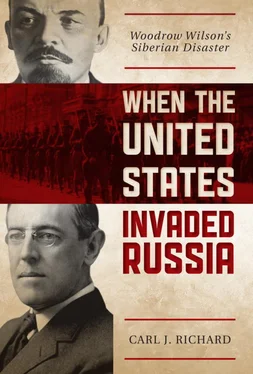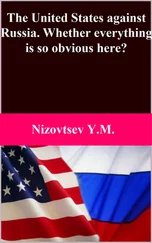Richard Goldhurst, The Midnight War: The American Intervention in Russia, 1918–1920 (New York: McGraw-Hill, 1978), 231, 264–65; Maddox, Unknown War with Russia , 110, 125; Richard Luckett, The White Generals: An Account of the White Movement and the Russian Civil War (New York: Viking, 1971), 322; Peter Fleming, The Fate of Admiral Kolchak (London: Rupert Hart-Davis, 1963), 166; Somin, Stillborn Crusade , 64–65, 165.
Goldhurst, Midnight War , 234; Melton, Between War and Peace , 200; Pereira, White Siberia , 130.
U.S. Department of State, Foreign Relations, Russia, 1919 , Charles D. Tenney to Robert Lansing, November 17, 545; David Macgowan to Robert Lansing, November 17, 546–47; November 18, 547; Goldhurst, Midnight War , 239, 241; Luckett, White Generals , 310; Dupuy, Perish by the Sword , 253.
U.S. Department of State, Foreign Relations, Russia, 1919 , Robert Lansing to Norman H. Davis, November 24, 124–25; John W. Davis to Robert Lansing, November 28, 125; Norman Hapgood to Robert Lansing, November 30, 126–27; December 2, 127; Charles D. Tenney to Robert Lansing, December 3, 229.
Ibid., Commission to Negotiate Peace to Robert Lansing, November 29, 126; Robert Lansing to John W. Davis, December 4, 129.
Link, Papers of Woodrow Wilson , Robert Lansing to Woodrow Wilson, December 23, 1919, vol. 64, 219.
U.S. Department of State, Foreign Relations, Russia, 1919 , John F. Stevens to Robert Lansing, December 24, 232; Charles D. Tenney to Robert Lansing, December 28, 235; December 30, 235; Luckett, White Generals , 311.
U.S. Department of State, Foreign Relations, Russia, 1919 , Paul S. Reinsch to Robert Lansing, August 29, 214; Fleming, Fate of Admiral Kolchak , 88.
Goldhurst, Midnight War , 264; Fleming, Fate of Admiral Kolchak , 217.
Graves, America’s Siberian Adventure , 91, 317; MacLaren, Canadians in Russia , 278.
Maddox, Unknown War with Russia , 130–31; Graves, America’s Siberian Adventure , 338; Melton, Between War and Peace , 205; Willett, Russian Sideshow , 258, 262.
Goldhurst, Midnight War , 257–58; MacLaren, Canadians in Russia, 1918–1919 , 212; Dupuy, Perish by the Sword , 270.
MacLaren, Canadians in Russia , 211; Link, Papers of Woodrow Wilson , Wilson to Norman H. Davis, July 3, 1920, vol. 65, 492; Linda Killen, The Russian Bureau: A Case Study in Wilsonian Diplomacy (Lexington: University Press of Kentucky, 1983), 140, 147; David W. McFadden, Alternative Paths: Soviets and Americans, 1917–1920 (Oxford: Oxford University Press, 1993), 337.
Luckett, White Generals , 384, 389; Fleming, Fate of Admiral Kolchak , 218.
George F. Kennan, Russia and the West under Lenin and Stalin (Boston: Little, Brown, 1960), 112; James William Morley, The Japanese Thrust into Siberia, 1918 (New York: Columbia University Press, 1957), 309; Maddox, Unknown War with Russia , 135; Fleming, Fate of Admiral Kolchak , 232; MacLaren, Canadians in Russia , 212.
William S. Graves, America’s Siberian Adventure, 1918–1920 (New York: Cape and Smith, 1931), 82.
Carl W. Ackerman, Trailing the Bolsheviki: Twelve Thousand Miles with the Allies in Siberia (New York: Charles Scribner’s Sons, 1919), 229.
For reference to the crucial role Wilson’s invitation played in breaking the deadlock within the Japanese Government concerning intervention, see James William Morley, The Japanese Thrust into Siberia, 1918 (New York: Columbia University Press, 1957), 312.
Arthur S. Link, ed., The Papers of Woodrow Wilson (Princeton, N.J.: Princeton University Press, 1966–1994), Newton D. Baker to Wilson, November 27, 1918, vol. 53, 227–28; March 3, 1919, vol. 55, 399; Betty M. Unterberger, The United States, Revolutionary Russia, and the Rise of Czechoslovakia , 2nd ed. (College Station: Texas A & M University Press, 2000), 260.
Richard Goldhurst, The Midnight War: The American Intervention in Russia 1918–1920 (New York: McGraw-Hill, 1978), 210, 220.
Link, Papers of Woodrow Wilson , Frank McAver and Others to Wilson, August 20, 1919, vol. 62, 433–34; Wilson to McAver, August 26, 1919, vol. 62, 515; Robert L. Willett, Russian Sideshow: America’s Undeclared War, 1918–1920 (Washington, D.C.: Brassey’s, 2003), 175, 193, 238.
George F. Kennan, Russia and the West under Lenin and Stalin (Boston: Little, Brown, 1960), 121.
Ibid., 122; Robert Lansing, The Peace Negotiations: A Personal Narrative (Boston: Houghton-Mifflin, 1921), 244–45, 255–56, 261, 267; Georg Schild, Between Ideology and Realpolitik: Woodrow Wilson and the Russian Revolution, 1917–1921 (Westport, Conn.: Greenwood, 1995), 13, 114; Frank Ninkovich, The Wilsonian Century: U.S. Foreign Policy since 1900 (Chicago: University of Chicago Press, 1999), 73, 75.
Schild, Between Ideology and Realpolitik , 114; Ninkovich, Wilsonian Century , 74; David S. Foglesong, America’s Secret War against Bolshevism: U.S. Intervention in the Russian Civil War, 1917–1920 (Chapel Hill: University of North Carolina Press, 1995), 297.
R. H. Bruce Lockhart, British Agent (New York: G. P. Putnam’s Sons, 1933), 285, 308.
Kennan, Russia and the West under Lenin and Stalin , 117; Linda Killen, The Russian Bureau: A Case Study in Wilsonian Diplomacy (Lexington: University Press of Kentucky, 1983), 130.
Graves, America’s Siberian Adventure , 158.
Ibid., 341–42.
Ilya Somin, Stillborn Crusade: The Tragic Failure of Western Intervention in the Russian Civil War, 1918–1920 (New Brunswick, N.J.: Transaction, 1996), 40; Betty M. Unterberger, America’s Siberian Expedition, 1918–1920 (Durham, N.C.: Duke University Press, 1956; reprint, New York: Greenwood, 1969), 164.
For a compelling account of Stalin’s reign of terror, see Anton Antonov-Ovseyenko, The Time of Stalin: Portrait of a Tyranny (New York: Harper and Row, 1981).
U.S. Department of State, Papers Relating to the Foreign Relations of the United States, Russia, 1918 (Washington, D.C.: Government Printing Office, 1931–1932; reprint, New York: Kraus, 1969), Ernest L. Harris to Robert Lansing, September 25, vol. 2, 387; November 1, vol. 2, 420; Ackerman, Trailing the Bolsheviki , 33; N. G. O. Pereira, White Siberia: The Politics of Civil War (Montreal: McGill-Queen’s University Press, 1996), 174.
Читать дальше












